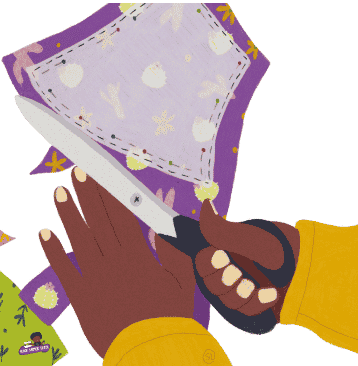Sign up for the Black Women Stitch quarterly newsletter! Check out our merch too!
Leave a BACKSTITCH message and tell us about your favorite episode.
Join the Black Women Stitch Patreon
Dubsado helps me organize the podcast. Try it for 20% off.
Lisa Woolfork
Lisa Woolfork is an associate professor of English, specializing in African American literature and culture. Her teaching and research explore Black women writers, Black identity, trauma theory and American slavery. She is the convener and founder of Black Women Stitch, the sewing group where Black lives matter. She is also the host/producer of Stitch Please, a weekly audio podcast that centers Black women, girls, and femmes in sewing. In the summer of 2017, she actively resisted the white supremacist marches in her community, Charlottesville Virginia. The city became a symbol of lethal resurging white supremacist violence. #Charlottesville. She remains active in a variety of university and community initiatives, including the Community Engaged Scholars program. She believes in the power of creative liberation.
Insights from this episode:
- How did Celeste know she was in the design world
- How her family influenced her artistic processes
- What type of things did Celeste study at Parsons that helped her nowadays
- Celeste’s thesis and how it has become truly personal for her
- What is Rat Virginity
- Celeste’s first collection “American Dream”
- The paradox of the United States' democracy
- Gucci Changemakers Award
- What’s next for Celeste’s life
- Celeste’s advice for keeping your stitch together
Quotes from the show:
- “I think American Dream for me is about telling the story of being un-American and anti-American while being also all American because these experiences that I’ve had in childhood, being part of an amazing beautiful Black family, but then also having like these really common American things like my nuclear family breaking apart at a young age” —Celeste Nicole in “Stitch Please”
- “We are the bed on which the American dream was slept. We are the sediment that allowed this country to be a country. There are few things more American than Black Americans” —Lisa Woolfork in “Stitch Please”
- “[About the Gucci scholarship] We got like this amazing opportunity to sit on different guest speakers, who would give us insight into the industry and sort of open our minds to the possibilities of where we can fit in within the industry because is not just all about making the clothes, there’s so much that happens from production and distribution” —Celeste Nicole in “Stitch Please”
- “What has taken me most of all on this journey is just being very connected to my child self that was not afraid to dream big and see big things for me” —Celeste Nicole in “Stitch Please”
Stay Connected:
Lisa Woolfork
Instagram: Lisa Woolfork
Twitter: Lisa Woolfork
Celeste Nicole
LinkedIn: Celeste Nicole
Instagram: Celeste Nicole
Facebook: Celeste Nicole
This episode was produced and managed by Podcast Laundry.
Sign up for the Black Women Stitch quarterly newsletter
Check out our merch here
Leave a BACKSTITCH message and tell us about your favorite episode.
Join the Black Women Stitch Patreon
Check out our Amazon Store
Stay Connected:
YouTube: Black Women Stitch
Instagram: Black Women Stitch
Facebook: Stitch Please Podcast


